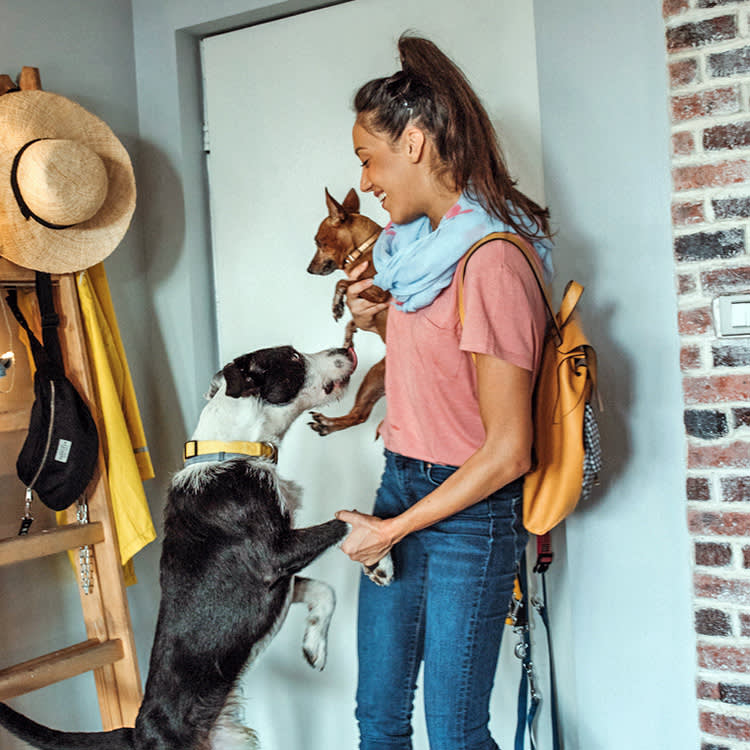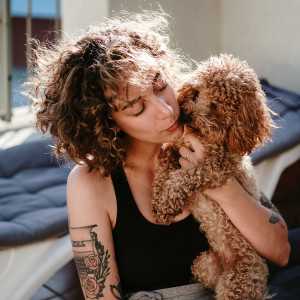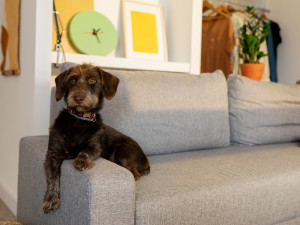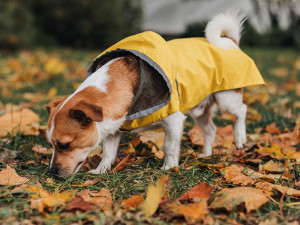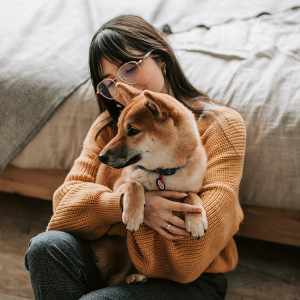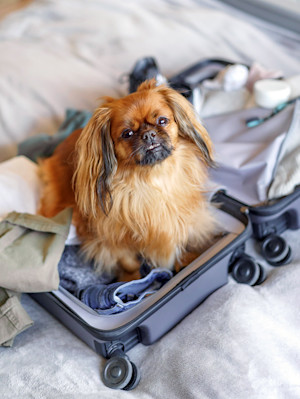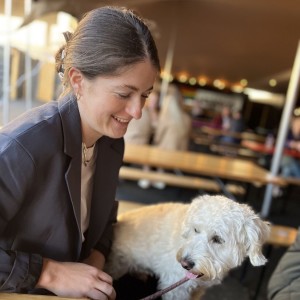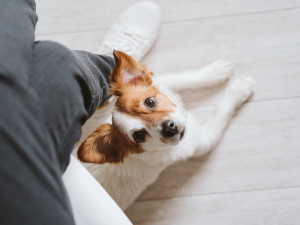Does Your Dog Know How Long You Go Away For?
Can dogs tell the difference between a day, a week or a month?
I’m the first to admit that my best friend is a dog. Living with mischievous Cockapoo, Bobby, hasn’t always been easy. From chewed furniture, scratched doors and 10pm zoomies, he’s tested our patience. While I made excuses for my ‘innocent’ puppy, Bobby sat on my knee oblivious and demanding tickles.
After training, bonding and growing up, Bobby – now four years old – has been by my side through it all. His steady routine, loyalty and love kept me grounded when everything else felt unstable.
So naturally when I planned a six-month trip, the biggest concern for everyone wasn’t my actual human partner who I was leaving, but my shadow, Bobby.
Leaving him with my family, he was in trusted hands and my mum assured me he missed me, as he sniffed my car every morning. Upon my return, I pictured a heartwarming reunion like those online videos. Everyone had their cameras ready as I got out of the car with open arms, almost worried he would have a heart attack from excitement.
But I needn’t have worried because Bobby ran straight past me. He acknowledged every family member there but the person who raised him.
Devastated, I questioned if he even remembered me. Can dogs truly miss their pet parents? We asked dog behaviourist and separation anxiety expert Jo Sellers from Pippin Pets Dog Trainingopens in new tab to provide all the answers on leaving your dog.
Where does your dog think you’re going when you leave?
If only dogs understood “just popping to the shop!” life would be easier. Unlike us, they can’t grasp concepts like errands or quick trips. They just know: you’re here, then you’re gone.
This can be especially hard on puppies. As Jo explains, “They rely on you for everything. So, naturally, your absence can trigger panic. For puppies especially, you are their main caregiver so when you leave, they worry about who will provide their food and shelter.”
But the good news? Over time, puppies learn your routines and build trust, making those short trips less stressful.
Can a dog tell the difference between a short trip and a longer holiday?
While dogs don’t grasp time like humans, they’re masters of scent. With around 300 million scent receptors compared to our measly five million, they practically “smell time” says Jo, explaining how they track our absence based on our fading body odour.
“Leaving for a few hours means your scent weakens gradually. If this pattern repeats, your dog learns to expect your return after a familiar decline in smell. That’s why you get the ecstatic greeting upon your return – a big whiff of you signifies you’re back.”
Since dogs lack the concept of counting days, longer absences simply mean your scent fades further. So, if you are away for weeks or months, your scent will dissolve and your dog adapts to a new normal.
Does your dog think you’re coming back?
While dogs might experience a little anxiety when you leave, they don’t necessarily think they’re being completely abandoned. Of course, if they have a history of abandonment or trauma, it’s different.
“They gauge your return on the scent left behind. As long as your scent lingers, they have no reason to think you won’t return,” says Jo. “When you return and your dog greets you with extreme excitement and follows you around, it’s a clear sign of how much they love you.”
Dogs are forgiving and take each day as it is so if you are leaving for longer, don’t feel too bad. As long as your dog receives enough cuddles, attention and food, they can adapt. But, they’ll still be thrilled to have you back!
Do dogs experience time differently to us?
While their lifespan and development differ, dogs don’t perceive time like us. “A dog’s concept of time revolves around routine, daily patterns, smell and associative learning,” says Jo. “They don’t understand abstract hours and minutes but pick up on external cues and smells to adapt.”
For example, your dog learns daylight and darkness patterns, helping them adapt to daily activities like sleep-wake cycles and feeding times. They can also anticipate recurring events and adjust their behaviour accordingly. This explains why my dog goes crazy when I boil the kettle after his evening walk – he knows it’s treat time.
Do dogs forget their owners after a long absence?
If you’re planning to leave your dog for a few months or even longer, don’t worry. “Your scent is imprinted in your dog for life,” says Jo. “While it depends on the personality of the dog, most will adapt to a new normal and caregiver without too much stress. But, when you return, your dog will pick up your scent.
“It can take a little bit of time, but amazingly, even after months or years, they never forget their loved ones.“
Rest assured, after a few hours, Bobby recognised my scent and we are now back to our old selves.
How can you tell if your dog misses you? Is it normal or is it separation anxiety disorder?
Like humans, dogs can feel sadness and loss when a loved one is gone. Whether it’s a family member’s death or a long vacation, a mildly anxious dog can become withdrawn and quiet. However, there’s a difference between missing you and separation anxiety.
While we can’t peek inside their minds and see if our dog is truly pining for us, certain signs can indicate a more serious issue requiring training. Jo shares some common signs of separation anxiety:
Destructive behaviour: chewing furniture, especially near exits, doors or windows, is a common sign of anxiety.
Vocalisation: howling, barking and whining excessively can all be expressions of distress.
Elimination issues: toileting accidents can be a sign of anxiety in dogs.
Physical signs: trembling, panting, excessive salivation and self-injury (like excessive paw licking or tail biting) can all indicate stress.
Repetitive behaviours: pacing, circling and repetitive barking are all signs of anxiety.
Loss of appetite: refusing food or treats entirely can be a physical symptom of anxiety.
If you notice any of these signs, consult a veterinarian or animal behaviourist to rule out any underlying medical issues and develop a training plan to help your dog cope with your absence.
How understanding your dog’s perception of time improves their well-being
Since dogs live in a world of routines and patterns, not numbers on a clock, consistency is key to their happiness. “Setting consistent times for feeding, walks and bedtime creates a predictable schedule that comforts your dog,” says Jo.
This predictability translates to less anxiety when you’re away. If you leave for the same duration each day but always return for their walk and meal, your dog learns to trust the pattern. This familiarity reduces stress and makes your absences less disruptive.
Easing separation anxiety: working with your dog’s clock
To ease separation anxiety, take advantage of their routine-based thinking. Start by slowly introducing alone time, as Jo suggests: “If you’re leaving for a big trip, practice shorter departures beforehand and gradually increase the duration.
“Some dogs, especially those with a genetic predisposition or past trauma, may need more time to adjust. In such cases, slow and steady therapy is important, gradually building up alone time with positive reinforcement.”
Remember, dogs are social creatures bred to be our companions. Therefore, very few dogs prefer to be alone, some are just better at coping with it.
When planning your trip, choose a trusted, experienced caregiver, whether it’s daycare or a relative. To further comfort your dog during your absence, maintain their routine as much as possible, including familiar food and scents. “Leaving an unwashed blanket or item of clothing with your scent can provide comfort – the stinkier the better,” advises Jo.
Ultimately, try to create a normal experience for your dog. Believe it or not (and I speak from experience), sometimes the pet parent suffers more separation anxiety than the dog. Remember, your dog doesn’t understand the complexities of goodbyes.
Instead of showering them with frantic affection or making a big scene at drop-off, stay calm and positive. A relaxed environment assures your dog that everything is OK. Shed a private tear in the car to the airport but trust that your dog will be just fine.
